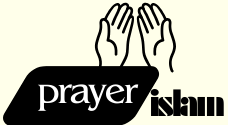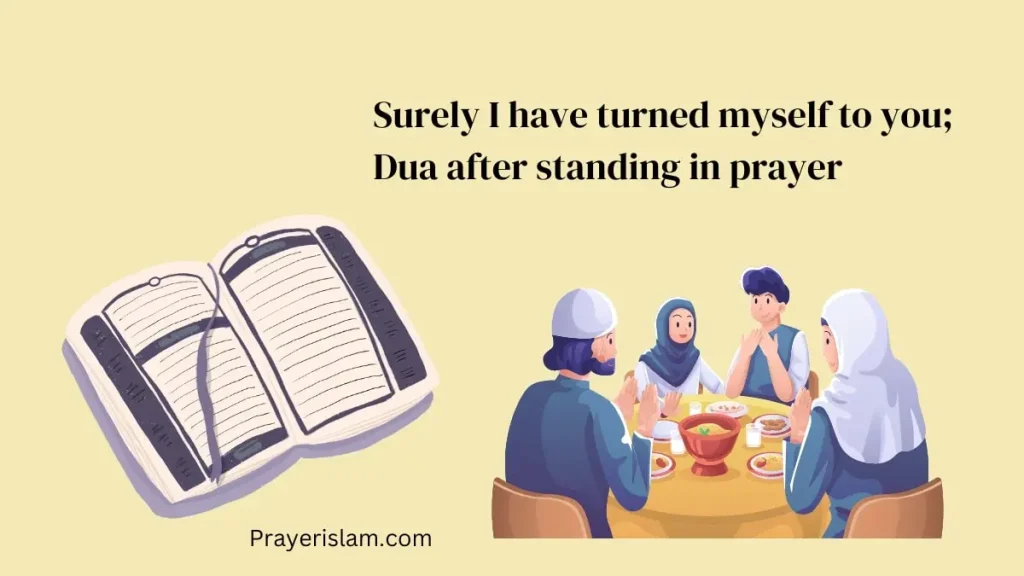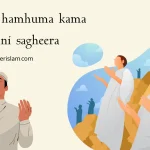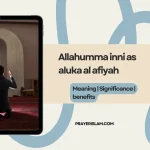Many say it is Sunnah to read ‘Surely I have turned myself to thee’ while standing at the place of prayer. But actually, it is not Sunnah. There is no such thing in any book of Fiqh. So there is no need to recite this dua.
The first thing to do after starting the namaz is to read the sana. Sanaa is ‘subhanaka obihamdika’ to fulfill it. Sometimes in Tahajjud Prayer, Rasulullah Sallallahu Alaihi Wasallam used to say ‘Allahumma Inni Wajhatu’ as Sanaa, so if you want you can recite this dua sometimes instead of Sanaa.
Maimuna (R.A.) narrated that the Prophet (S.A.W.) used to pray at the place of prayer. Prophet’s wife Aisha (RA) said, I used to sleep in front of the Prophet (PBUH) and my feet would be towards his Qibla (place of prostration).
When he used to remove my feet during sujood. Then I would fold my legs, and when he stood up I would stretch my legs. He said, at that time there was no light in the house. I used to lie on the bed in the middle of the qibla like a funeral. Narrated by Aisha (may Allah be pleased with her). He used to pray to the Prophet (PBUH) and me, and they and him (Bukhari Sharif).
Orwah (RA) said that the Prophet (PBUH) used to pray and Aisha (RA) used to lie between him and the Qiblah on their bed. (Bukhari Shareef) Narrated Anas Ibn Malek (may Allah be pleased with him) prostrating on cloth during summer.
Dua after for turned myself to thee
After standing in the place of prayer you can recite a dua. We present that prayer below for you. This supplication means devoting oneself to Allah and devoting worship to Him alone. So when you say this dua you can have turned myself to Allah.
اِنِّیۡ وَجَّهۡتُ وَجۡهِیَ لِلَّذِیۡ فَطَرَ السَّمٰوٰتِ وَ الۡاَرۡضَ حَنِیۡفًا وَّ مَاۤ اَنَا مِنَ الۡمُشۡرِکِیۡنَ
Pronunciation: Inni Wazzahatu Ojhiya Lillazi Fatarachhamawati Wal Arda Hanifaw Wama Ana Minal Mushrikin.
Meaning: ‘Surely I have turned myself to for Him who created the heavens and the earth. And I am not among the polytheists.
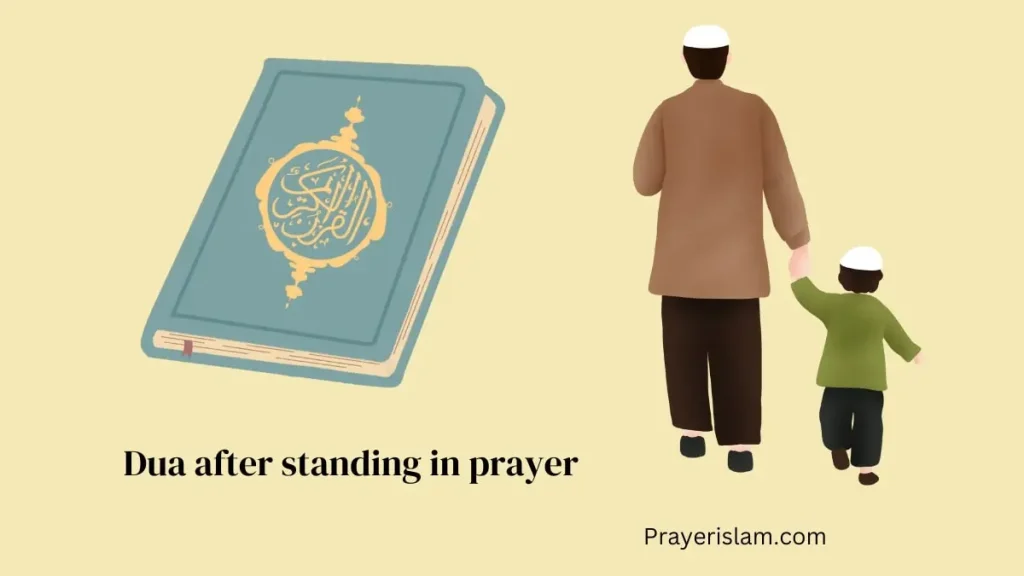
Turned myself to thee is wrong and pure
Some namaz teaching books show that إني وجهت وجي continues to call it the prayer of Zaynamaz. It is more common in quite old books.
Many people have an idea about this dua that after standing in prayer, the dua should be recited before saying Tahrima in Takbeer and reciting it is sunnah or nafl.
This is a common fallacy. There is no supplication in Hadith Sharif called Zaynamaz supplication. No reliable Fiqh-Fatwa book has written this matter that this dua should be recited before Tahrima in Takbeer. Rather, it is written in the famous book Hidayah of Hanafi fiqh that this prayer should not be recited before Tahrim in Takbir.
The first act after tTahrima in Takbeer is chanting. There are various chicks in Hadith Sharif. Among these, the ‘Subhanakallahumma’ chick is quite famous. Proven through multiple Sahih Hadim. However, Rasool Kareem, may God bless him and grant him peace, sometimes recited the supplication ‘Surely I have turned myself for Allah’ as a child in the Tahajjud prayer. (Sahih Muslim 771)
This is also known from other traditions. Then it was understood that the above supplication is not before the Tahrima in Takbeer; Rather, the dua recited after the Tahrima in the Takbeer. And even sometimes, Tahajjud prayers can be read if you want.
Why is it wrong and why is it right?
The source of Shari’ah rules and regulations is the Qur’an and the Prophet’s Sunnah, i.e. his words, deeds and support. Suppose you invent a new form of practice based on any source other than the Qur’an and the Prophet’s Sunnah and consider it to be particularly virtuous or make restrictions. In that case, it is either an innovation in the religion or Bid’ah.
The Prophet (PBUH) asked his ummah to avoid innovations or innovations in the religion. Rasool (PBUH) said, to stay away from all new inventions, all new inventions are innovation and all innovation is misguidance. (Sunan Tirmidhi, Sunan Abu Dawud, Musnad Ahmad)
FAQs
What is the significance of Surely I have turned myself to you?
This dua carries deep significance in Islam as it concludes the prayer and seeks Allah’s guidance, protection and blessings.
What are the benefits of reciting this dua?
Reciting this dua strengthens one’s connection with Allah, seeks forgiveness for sins, and seeks guidance and protection in daily activities.
Can this dua be read outside of prayer?
Yes, believers can recite this dua anytime to seek guidance, protection and blessings from Allah.
Is there a specific time for reciting this dua?
Although it is usually recited after the standing portion of the prayer, believers may recite it at other times as needed.
Is there a variation of this dua?
Yes, there are different versions of this dua recorded in different hadith collections. However, the essence remains the same.
Can non-Arabic speakers recite this dua?
Yes, transliteration and translation are available for those who cannot speak Arabic, enabling them to read and understand the meaning of dua.
Is there a recommended frequency for reciting this dua?
Although no specific frequency is prescribed, believers are encouraged to include it in their daily prayers and supplications.
What should be intended while reciting this dua?
Believers should recite this dua with sincerity, humility and firm belief in Allah’s mercy and ability to grant them what they ask for.
